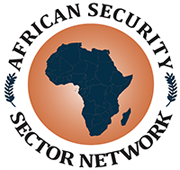Who We Are
The African Security Sector Network (ASSN) is a non-governmental network of African institutions, scholars & practitioners working in the areas of Security & Justice Reform. It was created in 2003 at Elmina, Ghana, out of a recognition of the need to harmonise and facilitate the activities of the various African organisations working in the area of Security Sector Reform and Governance (SSR/G). The network is headquartered in Accra, Ghana, with regional nodes in West, East and Southern Africa.
The principal objective of the network is to promote democratically governed and effective security for the peoples of Africa, and to enhance the capacity of African governments, security institutions, legislatures and Civil Society Organisations (CSOs) to undertake and own Security Sector Reform (SSR) programmes and projects.
The ASSN owes its uniqueness to its:
- Pan-African coverage, as the largest Security Sector Reform (SSR) specialist organisation of its kind; exchanging and synthesizing experiences and lessons from different traditions of security organisation and practice (Anglophone, Francophone and Lusophone).
- African-centred character, building and disseminating African principles, expertise and best practices.
- Multidisciplinary and cross-cutting membership –of researchers, analysts, civil society activists, parliamentarians and (active and retired) security practitioners– able to pool expertise, thus permitting the network to deal with a wide range of security sector issues in an integrated manner; and
- Multinational networking, which facilitates South-South sharing of experiences and lessons.
The ASSN has developed as a multidisciplinary network spanning academics, think-tanks, CSOs, security practitioners (active and retired), legislators in defence and security committees, etc., with a pan-African character. This inclusive structure enables sharing of experiences and lessons from different traditions of security organisation and practice (Anglophone, Francophone and Lusophone).
The network derives its core strength from its diverse competencies and locations (which enables it to work for change from both within and without); from a capacity for internal debate; and an ability to engage a broad range of security actors (national, regional and international), as well as policy-and decision-makers.
Vision
The driving vision of ASSN is that of an African security sector that is democratically governed, people-centred, well managed, accountable and effective in supporting and sustaining human security. The central feature of the ASSN vision is to promote an African-centred approach, which involves drawing primarily from indigenous knowledge, expertise and resources to support democratic Security Sector Governance (SSG) and design Security Sector Reform (SSR) programmes both pragmatic and sustainable.
The ASSN’s corporate mission is the transformation of security governance and promotion of peace and justice in Africa through:
- Supporting policy and institutional development at the continental, regional and national level, by working to strengthen the capacities of inter-governmental organisations (African Union and RECs), African governments, national security actors, Parliaments and oversight institutions, and civil society groups to undertake and implement SSR/G programmes.
- Enhancing security governance in Africa by promoting an African-centred focus, disseminating African practices in the areas of SSR/G and by serving as a continental information repository.
- Promoting and facilitating the emergence of African SSR/G networks and expertise; enhancing security literacy among African decision makers and the general public.
- Advocacy and promotion of inclusive dialogue and informed debate around issues of security and justice, designed to influence decision makers and policy processes.
- Identifying, listing and making easily accessible the literature and resource material related to SSR/G in Africa.
Core Values
The core values of the ASSN are an Africa-centred agenda, Accountability and Transparency, Inclusivity, Integrity and Objectivity, Diversity, Responsiveness, Sustainability and Partnership.
Activities
The ASSN carries out a wide range of activities, both at the corporate level and through its member organisations. Over time, six core roles have evolved:
1. Support to Policy development and SSR/G implementation via:
- Working with the African Union and the Regional Economic Communities (RECs) to promote African approaches to SSR.
- Working with national governments and security actors to build policy and institutional capacity to address security issues within a democratic and accountable framework.
- Working with African parliaments and rule of law institutions to improve their security oversight capabilities and with civil society organisations (CSOs) to equip them with the skills (political as much as technical) to engage (and transform) the security sector.
- Working with civil society and the media to support the implementation of the African Union Policy Framework on Security Sector Reform (AU-PFSSR).
2. Research: Mapping African security governance via policy-oriented research.
3. Expertise: Development of the ASSN Roster and provision of advisory and consultancy services.
4. Security Literacy: Enhancing security literacy among African decision makers and the public at large through training, education, and dissemination of resource materials.
5. Advocacy: Engaging with African governments, external partners and Civil Society Organisations (CSOs) interested in supporting SSR in Africa.
6. Resource materials: The online Document Library gives access to a rich collection of literature and other documents on the security sector in Africa and related themes.
While the original mandate of the ASSN was that of facilitating the activities of its member organisations (and this remains an important part of its assignment), increasingly over time the priority has shifted to constituting the ASSN as a pan-African network, providing Support to Policy Development and SSR/G Implementation, available to the African Union, African Regional Economic Communities (RECs), national governments and external partners who share the values of the ASSN and its network. This necessitated the creation of an independent Secretariat for the network (replacing the earlier skeletal administrative structure) and a personality separate and distinct from that of its member organisations. The ASSN Secretariat was established in 2010 with the generous contribution of the UK government through the then Department for International Development, DFID (now the Foreign, Commonwealth & Development Office/ FCDO). It is based in Accra, Ghana, and coordinates the activities of the network.
